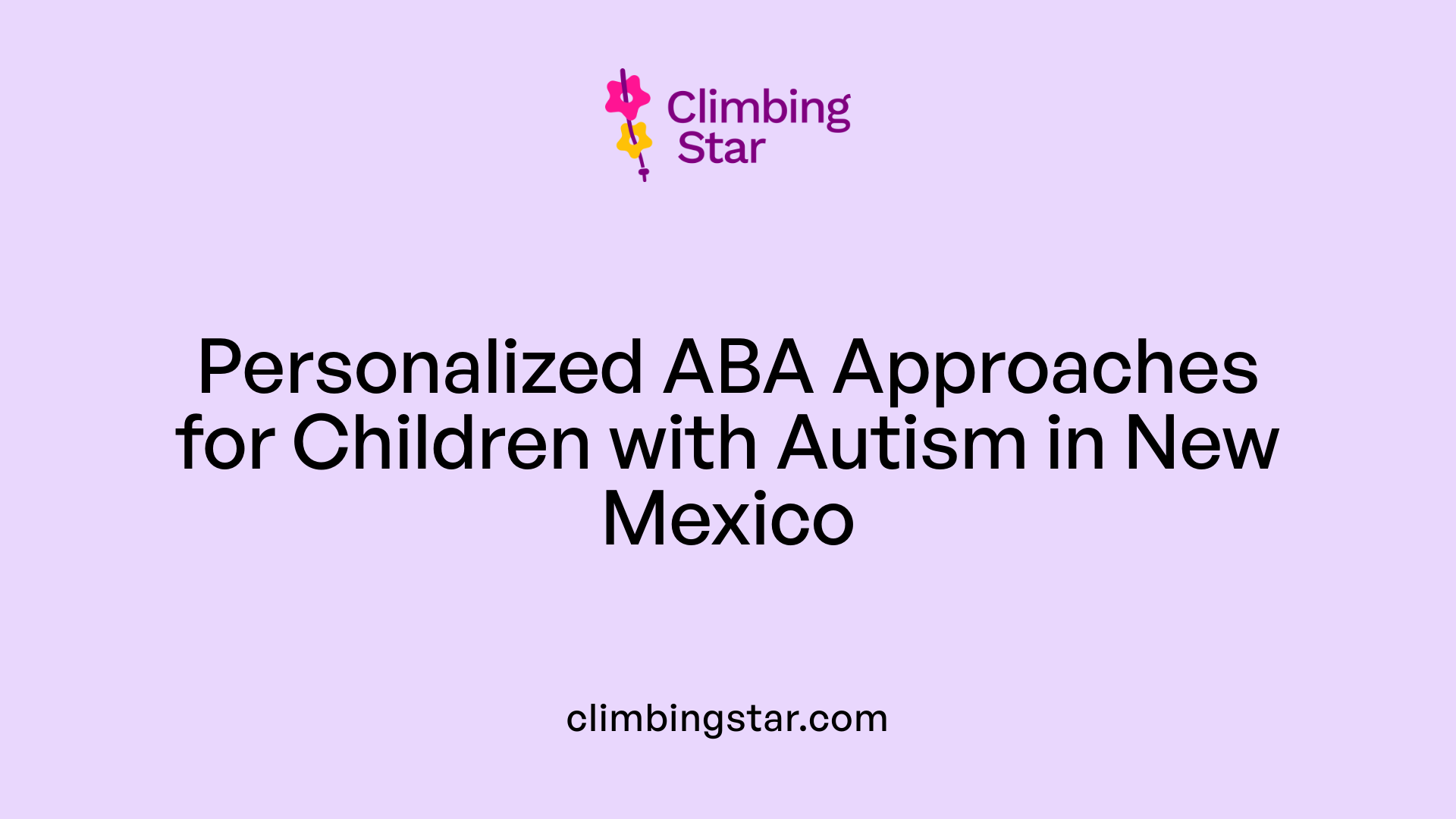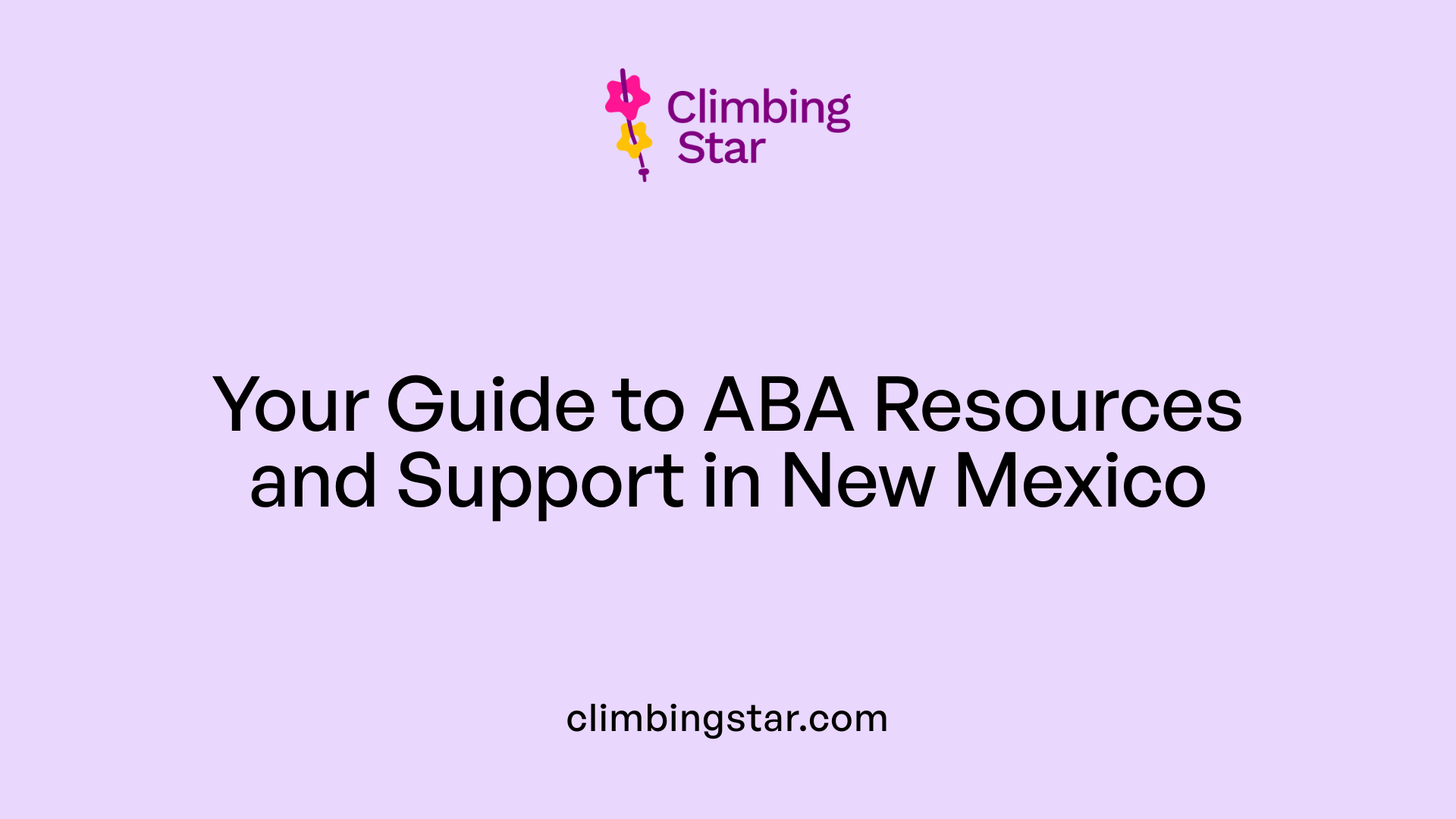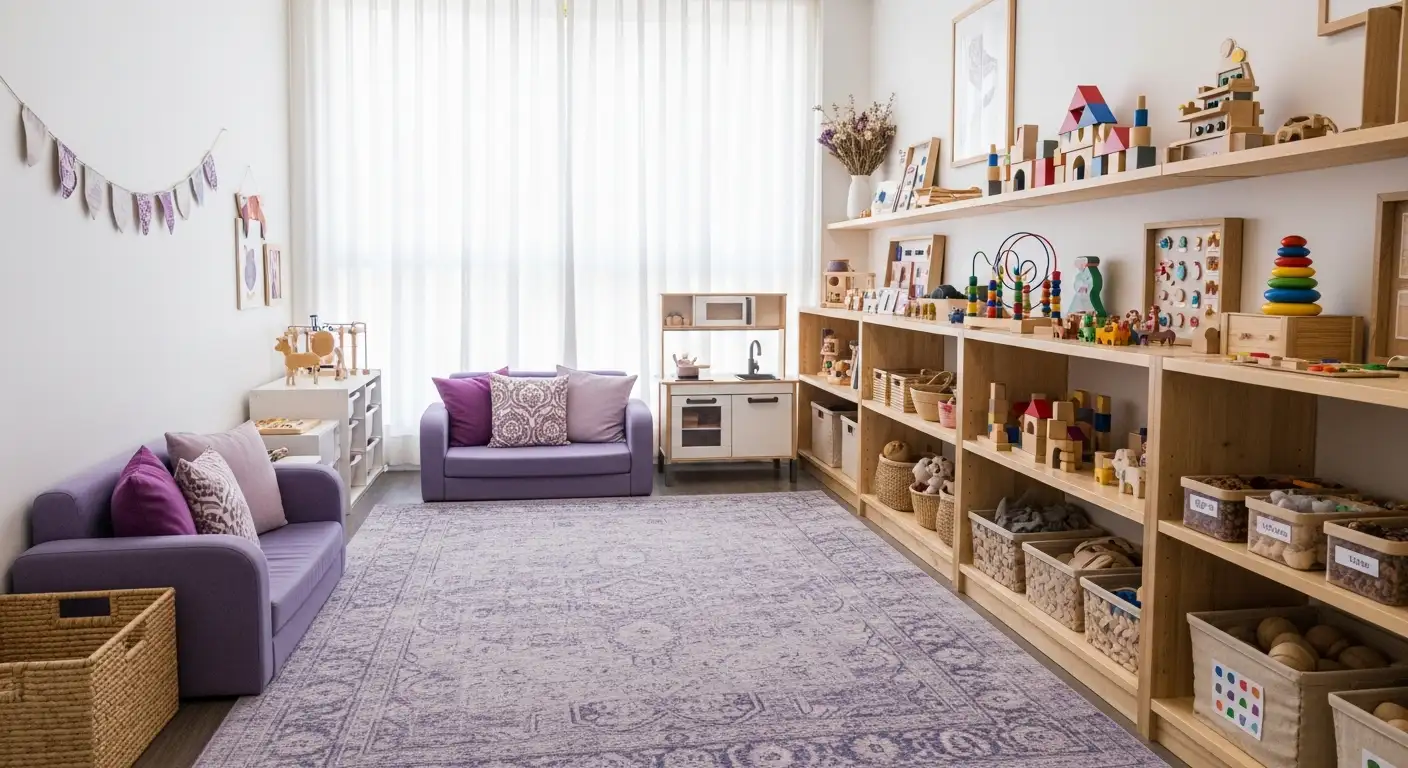Understanding Autism and Applied Behavior Analysis Therapy
Autism spectrum disorder (ASD) affects communication, social skills, and behavioral patterns, with early diagnosis and intervention being crucial for improving outcomes. Applied Behavior Analysis (ABA) therapy is a widely used, evidence-based approach designed to help individuals with autism develop essential life skills and reduce challenging behaviors. New Mexico offers a range of ABA therapy services, supported by qualified professionals and state programs to assist families in navigating care options and insurance.
What is Applied Behavior Analysis (ABA) Therapy?

What is applied behavior analysis (ABA) therapy?
Applied Behavior Analysis (ABA) therapy is a scientifically supported method designed to help individuals, particularly children with autism spectrum disorder (ASD), enhance positive behaviors and reduce challenging ones. It uses principles of learning like reinforcement and prompting to teach essential skills related to communication, social interaction, and independence.
Therapeutic goals and methods
The core goals of ABA therapy include building communication skills, improving social behaviors, and fostering independence. Methods vary and can include center-based, in-home, school-based, and telehealth services. Treatment plans are individualized based on thorough assessments by certified professionals, ensuring that interventions align with each child’s unique needs and interests.
Evidence base and modern approaches
ABA is an evidence-based practice, continuously refined to incorporate new scientific insights and best practices. Modern approaches often employ play-based and naturalistic strategies rather than solely relying on traditional techniques like Discrete Trial Training. This flexibility supports better engagement and long-term skill retention.
Family involvement
Family participation is vital in ABA therapy. Caregivers receive education and training to reinforce positive behaviors at home, creating consistency and better generalization of skills. Collaboration with families also informs the adaptation of treatment plans to respect the child’s emotional and social context.
Controversies and considerations
Despite its effectiveness, some criticisms of ABA therapy focus on concerns about the intensity and emphasis on conformity. Advocates stress the importance of tailoring treatments to respect neurodiversity and emotional well-being, ensuring therapy supports the individual holistically rather than simply correcting behaviors.
| Aspect | Description | Example in New Mexico Context |
|---|---|---|
| Delivery formats | Center-based, in-home, school-based, telehealth | LEARN and Camino ABA offer multiple service formats to fit family needs |
| Professional support | BCBAs, doctoral clinicians, behavior technicians | LEARN’s team includes highly trained experts to provide individualized care |
| Family involvement | Training and collaboration for consistent behavior support | Camino ABA provides caregiver education for reinforcing positive behaviors |
| Evidence-based practice | Use of scientific data and updated techniques | ABA programs across New Mexico adapt to evolving research and best practices |
| Ethical considerations | Tailoring therapy to respect neurodiversity and emotional health | Providers emphasize individualized, respectful approaches in therapy plans |
Tailoring ABA Therapy to Individual Needs in New Mexico

How is ABA therapy tailored for individuals with autism?
ABA therapy in New Mexico is carefully individualized to meet each child’s unique profile. The process begins with a thorough assessment conducted by Board Certified Behavior Analysts (BCBAs), who gather information through caregiver interviews and direct observation. This comprehensive evaluation identifies the child’s strengths, challenges, learning styles, developmental levels, and specific needs.
Based on this assessment, therapists develop customized treatment plans with clear, measurable goals. These plans focus on promoting communication skills, social interaction, independence, and reducing challenging behaviors. The plans are not static; therapists continuously collect data on progress and adapt strategies to ensure effectiveness.
The approach respects each child’s learning preferences and developmental stage, adjusting therapy techniques accordingly. For example, some children benefit more from in-home sessions, while others thrive in center-based or school environments. Telehealth options further increase accessibility.
Families play an integral role in treatment planning and implementation, with training provided to caregivers to reinforce positive behaviors outside therapy sessions. This collaborative, data-driven, and flexible model ensures that ABA therapy in New Mexico is truly personalized to foster the best possible outcomes for each child on the autism spectrum.
Qualified ABA Therapy Providers and Professional Standards

Who provides ABA therapy and what qualifications do they have?
ABA therapy in New Mexico is delivered by highly trained professionals, including Board Certified Behavior Analysts (BCBAs), behavior technicians, and doctoral-level clinicians. BCBAs, who hold certification from the Behavior Analyst Certification Board (BACB), complete specialized graduate education in behavior analysis and extensive supervised practical experience. These experts are responsible for conducting assessments, developing tailored treatment plans, and overseeing therapy implementation.
Registered Behavior Technicians (RBTs) and other trained therapists work directly with children under BCBA supervision. They receive specific training in autism spectrum disorder (ASD), behavioral intervention techniques, and adhere to strict ethical standards to ensure quality care.
What roles do BCBAs and technicians play?
- BCBAs: Lead assessments and design individualized ABA therapy plans based on evidence-based practices. They consult with families and adapt interventions as needed.
- Technicians: Implement daily therapy sessions, collect data, and provide direct support to the children.
How is the state regulatory environment structured?
New Mexico’s Human Services Department and Health Care Authority maintain clear policies and billing frameworks for ABA providers, ensuring that therapy services meet professional and ethical guidelines. These agencies provide templates, attestations, and program rules that support a standardized approach to behavioral health and autism services in the state.
What standards support staff training and certification?
ABA providers in New Mexico benefit from ongoing professional development and training requirements tied to BACB certification. The availability of specialized templates and attestations for BCBAs and Board Certified Assistant Behavior Analysts (BCaBAs) reflects a structured workforce committed to maintaining clinical excellence and compliance.
How is ethical practice ensured?
The ABA therapy providers operate under a strict ethical code that emphasizes scientific evidence, individualization of care, and family involvement. This ethical framework supports the delivery of safe, effective therapy tailored to children’s unique needs.
| Role | Qualifications | Responsibility |
|---|---|---|
| Board Certified Behavior Analyst (BCBA) | Graduate-level education, BACB certification, supervised experience | Assessment, treatment planning, supervision |
| Registered Behavior Technician (RBT) | Specific behavior technician training, supervised by BCBA | Implementation of therapy, data collection |
| Doctoral-level Clinicians | Advanced degrees (PhD), expertise in behavioral health | Leadership, complex case consultation |
This professional framework ensures that families in New Mexico receive high-quality ABA therapy guided by competent, ethical, and well-trained providers.
ABA Therapy Techniques and Effectiveness in New Mexico Settings
What are common techniques used in ABA therapy?
ABA therapy in New Mexico utilizes a range of techniques to support children with autism. These include positive reinforcement, discrete trial training, and natural environment teaching, which help encourage desirable behaviors through rewards and real-world practice. Therapists also use prompting and fading strategies to gradually build independence, along with the ABC (Antecedent-Behavior-Consequence) model to understand and reshape behaviors effectively.
Additional methods like task analysis break down complex skills into manageable steps, while modeling demonstrates correct behaviors for children to imitate. Token economies further motivate progress by offering tokens or points that can be exchanged for rewards. These techniques are tailored by professionals such as Board Certified Behavior Analysts (BCBAs) to meet individualized needs, enhancing communication, social skills, and everyday life abilities.
How effective is ABA therapy in improving outcomes for individuals with autism?
Evidence shows ABA therapy is highly effective in improving outcomes for children and adults on the autism spectrum, especially when started early. Local organizations like LEARN and Camino ABA provide individualized programs that focus on building key skills like communication, social interaction, and independence, while reducing challenging behaviors.
The therapy's evidence-based approach uses positive reinforcement and direct instruction to develop essential life skills including self-care and emotional regulation. Its success relies on personalized treatment plans informed by assessments and caregiver input, fostering strong family involvement.
Research indicates that consistent, tailored ABA therapy enhances social and communication abilities significantly, aiding better integration at home, school, and in the community. Early interventions supported by providers in New Mexico align with national best practices, underscoring the importance of timely diagnosis and therapy initiation to maximize developmental gains.
Navigating ABA Therapy Resources and Support in New Mexico

What should families consider when choosing an ABA therapy provider?
Families looking for ABA therapy in New Mexico should prioritize providers with strong credentials and a commitment to individualized care. Leading organizations in the state, such as LEARN and Camino ABA, employ board certified behavior analysts (BCBAs) and highly trained clinicians who develop customized treatment plans based on thorough assessments. This ensures therapy aligns with each child's unique needs and family involvement.
Available local ABA providers
New Mexico offers several accessible ABA therapy providers, particularly in Albuquerque and southern regions including Las Cruces and Anthony. LEARN provides flexible service formats: center-based, in-home, school-based, and telehealth. Camino ABA emphasizes early intervention and includes occupational and speech therapies alongside ABA, broadening support options. Aprendamos Family of Services has served local families for over 20 years, catering to a wide spectrum of autism support needs.
Insurance assistance and advocacy
Navigating insurance can be challenging for families seeking ABA therapy. Providers like LEARN and Camino ABA assist families with insurance coverage navigation and advocacy, including support for Medicaid members. These services help reduce financial barriers, enabling families to access essential therapies.
State programs and policies
The New Mexico Human Services Department actively supports ABA therapy through structured guidelines, billing templates, and provider credentialing, fostering an organized service environment. State policies are designed to ensure consistent, quality behavioral health services. The New Mexico Health Care Authority also emphasizes accessible, high-quality autism care as part of its mission.
Family education and involvement
Effective ABA therapy programs encourage family participation. Clinics like Camino offer caregiver training to empower parents in reinforcing positive behaviors at home. Collaboration with families helps tailor interventions and strengthens treatment outcomes.
Multi-disciplinary services
Many New Mexico providers integrate additional services such as occupational and speech therapy within their ABA programs. These multi-disciplinary approaches address diverse developmental needs, promoting comprehensive support beyond core ABA strategies.
This wealth of resources and coordinated support helps families navigate ABA therapy confidently, ensuring children with autism in New Mexico receive effective, personalized care.
Accessing Quality Autism Resources in New Mexico
New Mexico offers an ecosystem of ABA therapy resources responsive to diverse family needs, characterized by qualified professionals, evidence-based individualized care, and strong state support. Families seeking autism services benefit from understanding evidence-based techniques, verifying provider credentials, and engaging with community and insurance resources to ensure optimal outcomes. Early intervention and sustained ABA therapy remain central to improving communication, social skills, and daily living activities for individuals with autism throughout the state.
References
- New Mexico ABA Therapy - Autism Therapy & Services
- ABA (Applied Behavior Analysis) Provider Information
- ABA Therapy for Autism | Child-Led, Evidence-Based Care
- ABA Therapy Provider Albuquerque | ABA Therapy Clinic
- What is ABA Therapy: Techniques and Dimensions
- The Controversy Around ABA
- Applied Behavior Analysis (ABA) for Children With Autism
- 6 Benefits of ABA Therapy for Children with Autism
- 7 Things to Look for in a Quality ABA Provider
- Tips for Choosing a Provider for Applied Behavior Analysis ...






